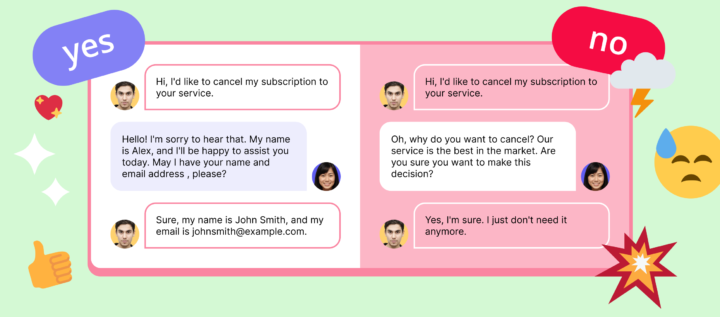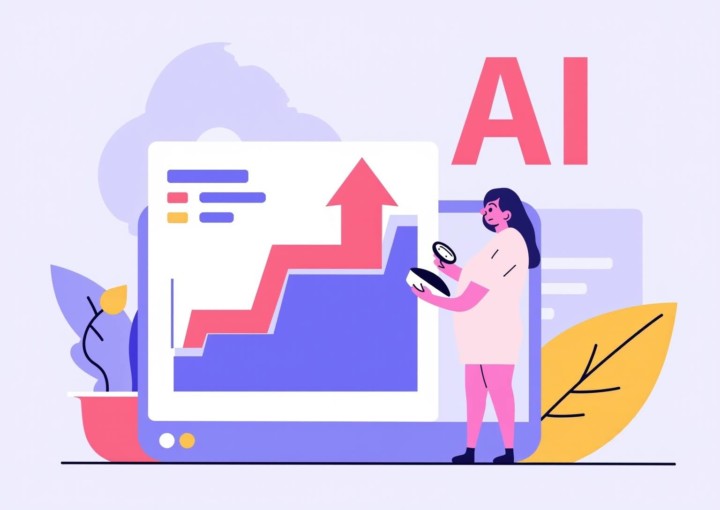What is the most direct cause of customer loyalty? Understanding your customers’ needs
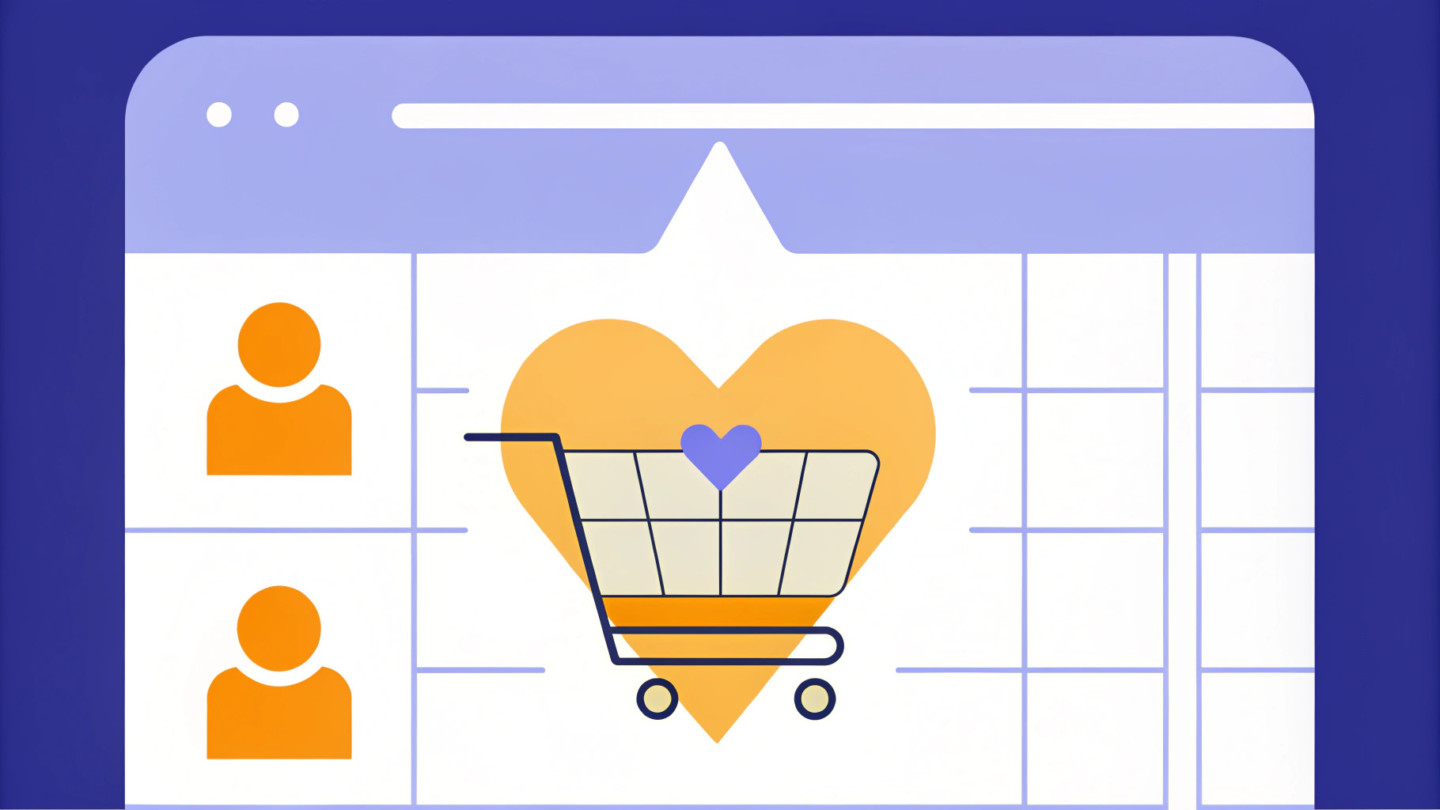
Overview
The foundation of customer loyalty lies in the emotional connections that businesses nurture with their customers. By offering personalized experiences and embracing shared values, companies can forge bonds that truly resonate. It’s essential to recognize that fostering these emotional ties, alongside delivering high-quality products and effective service, cultivates deeper commitment and advocacy. Statistics reveal that many consumers prioritize brands that connect with them on an emotional level, highlighting the importance of this approach in today’s market.
Introduction
In today’s world, where consumer choices abound and competition is fierce, we understand that grasping the essence of customer loyalty is more crucial than ever for businesses. This loyalty goes beyond mere transactions; it is rooted in emotional connections, trust, and satisfaction that drive customers to repeatedly choose a brand. As we navigate the complexities of 2025, the real challenge isn’t just attracting new customers, but nurturing lasting relationships with those we already have.
Many consumers feel underserved by existing loyalty programs, which highlights a pressing need for businesses to innovate and personalize their approaches. By prioritizing customer experience and adopting effective loyalty strategies, organizations can not only improve retention but also turn loyal customers into passionate advocates. This transformation paves the way for sustainable growth and success in an ever-evolving marketplace.
We get it — running a business is hard. But with the right focus on customer loyalty, you’re not just surviving; you’re thriving. Let’s explore how to make those emotional connections work for you.
Defining customer loyalty: A key to business success
Consumer allegiance raises an important question: what truly drives customer loyalty? It’s about more than just transactions; it’s about nurturing a continuous emotional bond between buyers and brands. This connection indicates a buyer’s tendency to repeatedly choose the same brand over time. It’s built on trust, satisfaction, and a genuine sense of belonging. As we look ahead to 2025, with competition intensifying, fostering this devotion has never been more crucial for businesses.
Loyal customers not only tend to spend more but also offer invaluable feedback and become brand advocates, helping to drive organic growth. Yet, a recent study shows that only 22% of members feel very satisfied with the personalization they receive from reward programs. This highlights a vital area for improvement. By focusing on client experience, personalized assistance, and effective reward programs, businesses can significantly enhance client retention. After all, keeping current clients is often more economical than acquiring new ones.
By addressing emotional connections and improving customer experiences, businesses can cultivate deeper commitment. This leads us back to the question of what directly causes customer loyalty, which is essential for long-term profitability and overall success. Notably, only 22% of companies currently offer reward programs with a premium element, indicating a trend that businesses should consider to refine their retention strategies.
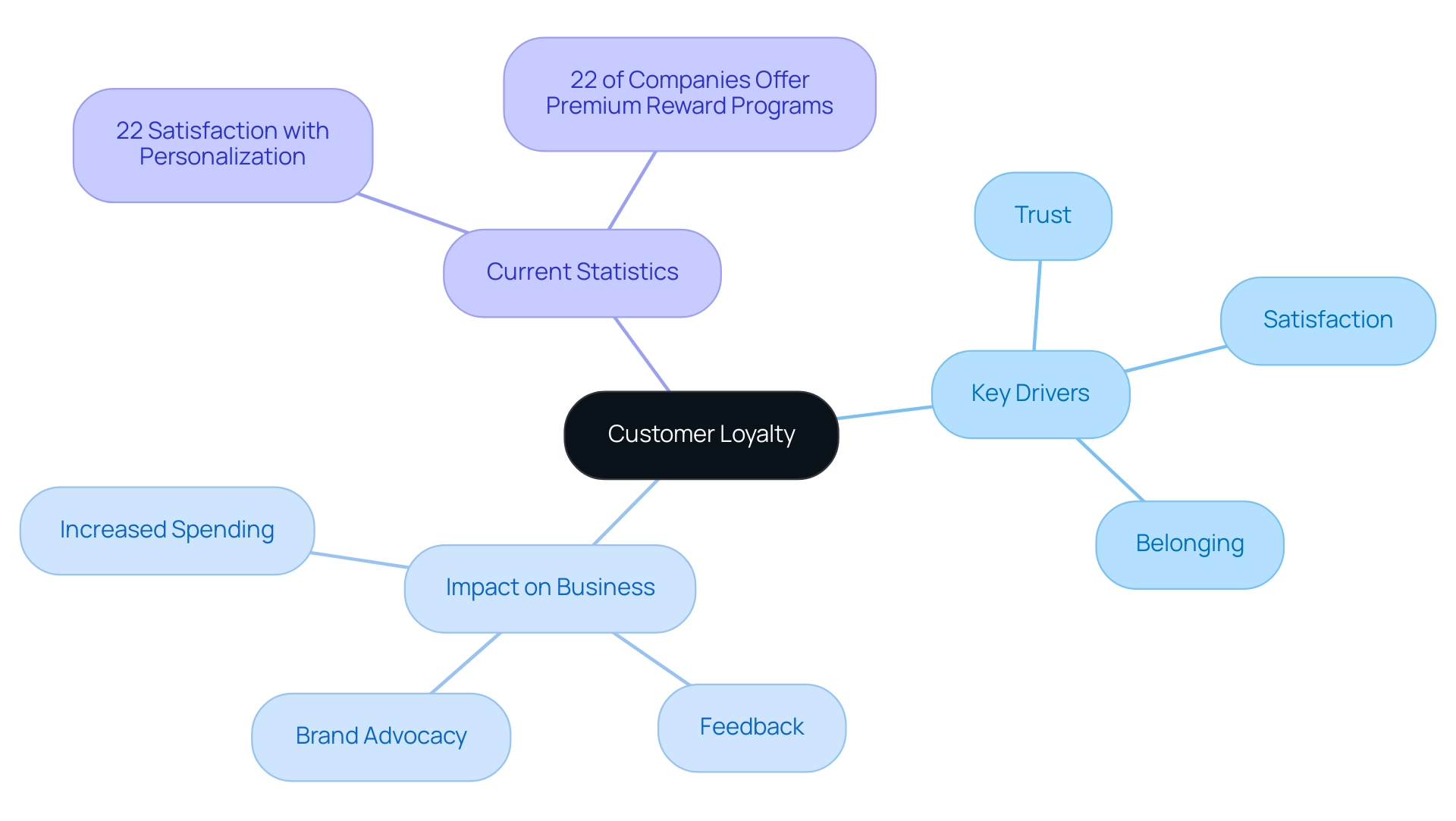
Key drivers of customer loyalty: What really matters?
Understanding customer commitment can feel overwhelming, but several crucial factors can guide you toward fostering loyalty. At the heart of this commitment lies product quality, trust in your company, and the emotional connections you build with consumers. As we approach 2026, it’s clear that high-quality offerings that meet or exceed expectations are essential for nurturing customer allegiance. Trust, often built through consistent positive experiences and transparent communication, raises an important question: What truly drives customer loyalty?
Consider this: a recent survey found that one-third of consumers are more likely to purchase from companies whose CEOs are transparent on social media. This highlights how leadership visibility can enhance trust and loyalty. Additionally, it’s worth noting that Gen Z is now 57% less loyal to brands post-pandemic. This shift in consumer behavior is something every company needs to address. Emotional connections play a vital role in loyalty too; personalized interactions and shared values create deeper bonds, leading customers to prefer one brand over another.
In Saudi Arabia, the rewards market is projected to reach USD 1.59 billion by 2028, emphasizing the importance of understanding these dynamics. Companies that establish emotional ties and maintain high product quality not only retain clients but also position themselves advantageously in a competitive landscape. Furthermore, 33% of retailers have introduced features that allow members to track points, showcasing practical applications of reward strategies.
A pertinent case study shows that mobile applications designed for tracking rewards points can significantly enhance user experience and engagement. This further strengthens the connection between product quality, trust in your company, and user commitment. Remember, the fix is simpler than you think — by focusing on these key areas, you can build lasting loyalty among your customers.
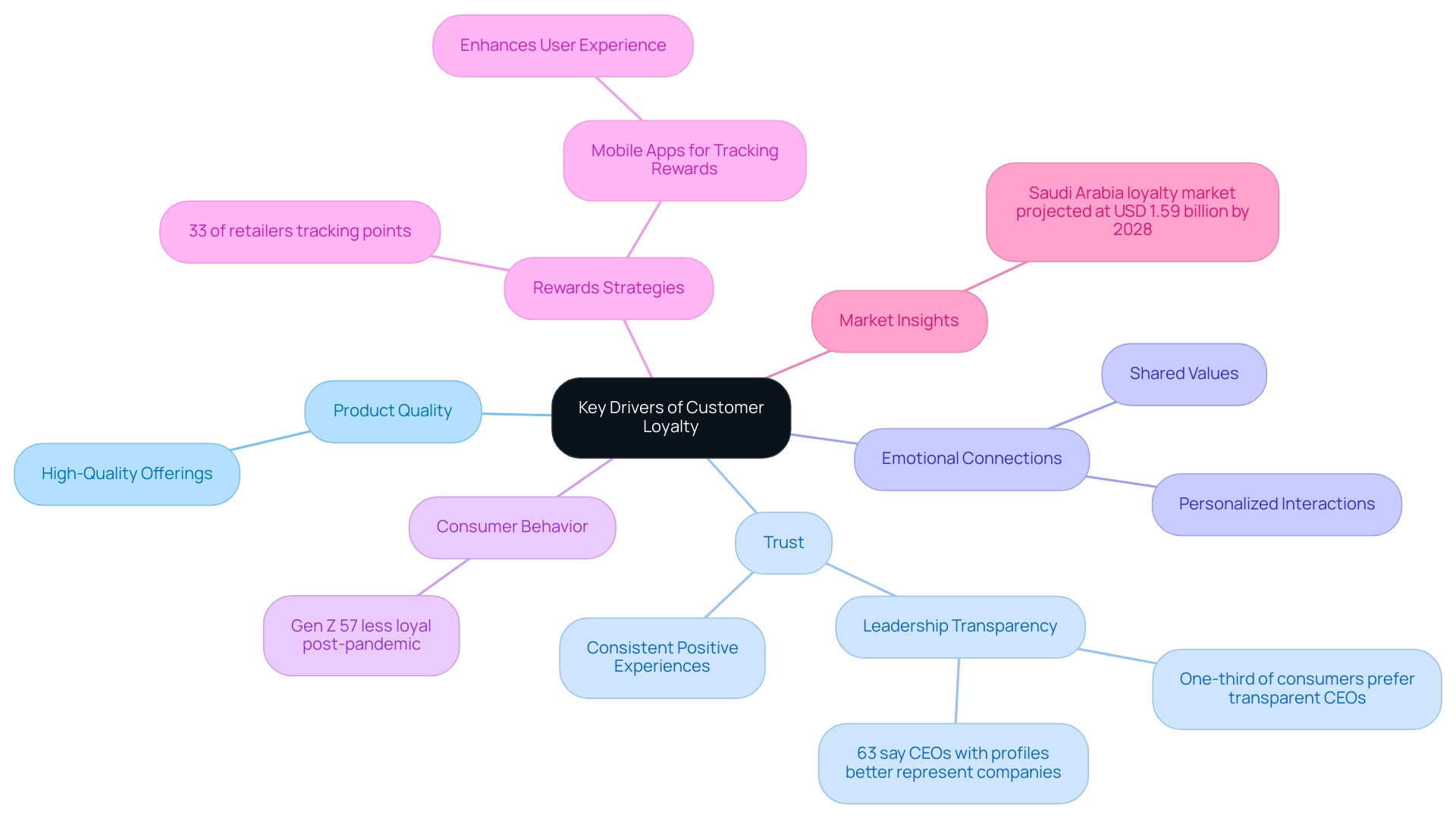
Understanding customer needs: The foundation of loyalty
Understanding your clients’ needs is not just important — it’s essential for fostering loyalty and satisfaction. We know that listening to feedback, conducting thorough surveys, and analyzing purchasing behaviors can feel overwhelming. But here’s the good news: studies show that 80% of consumers prefer brands that offer personalized experiences. This is where you can make a real difference.
With 44% of assistance teams planning to invest in chatbots in 2024, and 70% of C-level service executives looking to AI for support, leveraging technology is crucial for gaining deeper insights into your clients. Dashly‘s AI-driven omnichannel communication tools simplify your interactions by consolidating queries from various channels in one shared inbox. This allows you to analyze feedback and performance cohesively, making it easier to understand your clients. By utilizing data analytics through Dashly, you can create tailored offerings that truly resonate with your audience, nurturing a deeper emotional connection.
Imagine features like saved replies and note-taking capabilities, alongside an AI support bot that manages up to 40% of user queries. These tools not only enhance the efficiency of your support teams but also free up valuable time to focus on what matters most — your clients. As Sam Walton wisely said,
There is only one boss. The client. And he can fire everybody in the company from the chairman on down, simply by spending his money somewhere else.
This highlights the necessity for companies to prioritize client insights. Understanding the root causes of customer loyalty can help you cultivate commitment and build long-lasting relationships.
Moreover, effective feedback mechanisms, including Dashly’s analytics, can reveal preferences and pain points, guiding you in adapting your strategies to not just meet but exceed client expectations. Importantly, businesses using Dashly’s tools can achieve a 50% reduction in calls and emails, significantly improving response times. This boost in efficiency translates to greater satisfaction and retention, as delays can lead to frustration and loss of clients. Let’s take the next step together — your clients deserve it.
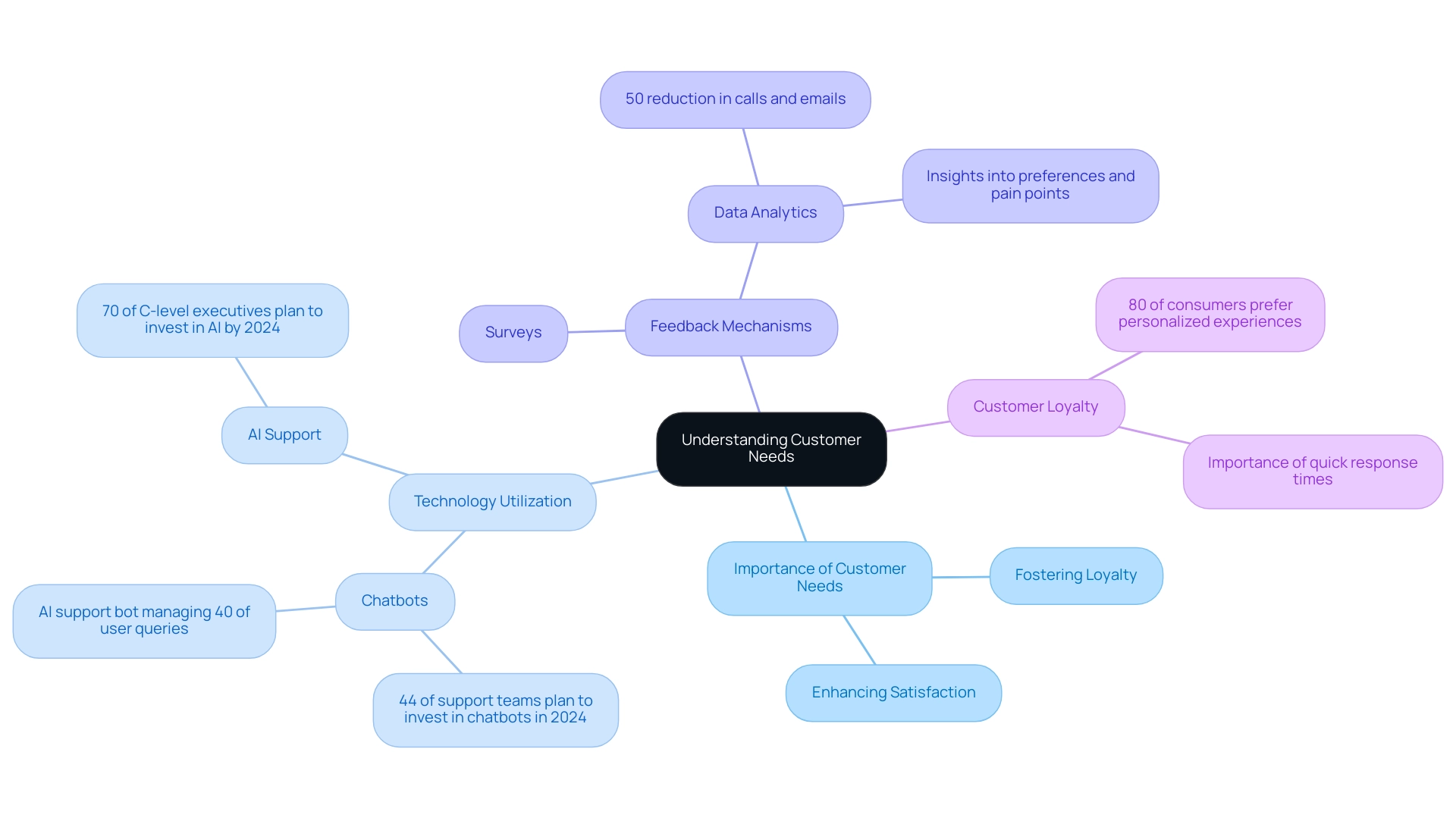
Raise customer loyalty with support tools from Dashly:
The impact of customer service on loyalty: Going beyond expectations
Client support is essential in shaping client commitment, as it directly influences customer loyalty and the overall client experience. Businesses that prioritize timely, empathetic, and effective support can uncover the key drivers of customer loyalty, leading to sustained client retention. For instance, Zappos has carved out a niche by consistently delivering outstanding service, a commitment that has solidified its reputation and fostered high levels of loyalty.
Research shows that a staggering 73% of consumers will switch to a competitor after just a few negative experiences. This statistic raises an important question: what truly drives customer loyalty? It underscores the necessity of exceeding client expectations. However, with 54% of support teams lacking the tools they need to personalize their assistance at scale, companies face significant challenges in delivering effective service. Investing in tools like Dashly, which offers AI-driven omnichannel communication and automation solutions, is crucial for creating memorable interactions that encourage repeat purchases.
Dashly’s capabilities allow businesses to manage user inquiries seamlessly across various channels, enhancing the experience and reducing response times. Additionally, Dashly provides self-service support options, such as a knowledge base and an AI support bot that can handle up to 40% of user queries, further easing the burden on support agents. Insights from inbound calls reveal that 82% of marketers believe these insights can help identify costly blind spots in service strategies, emphasizing the importance of understanding client needs.
Moreover, with 81% of consumers now viewing AI as an integral part of modern service, Dashly empowers companies to streamline operations and enhance interactions. This leads us back to the question of what drives customer loyalty. Notably, Dashly clients have reported a 50% decrease in calls and emails after implementing live chat, demonstrating the effectiveness of its tools in improving communication efficiency. As Sam Walton wisely stated, ‘There is only one boss. The client. And he can fire everybody in the company from the chairman on down, simply by spending his money somewhere else.’ This sentiment highlights the vital importance of investing in client support as a cornerstone for fostering commitment in 2025.
Building emotional connections: The heart of customer loyalty
The emotional ties that companies create with their audience are the most direct cause of customer loyalty. We understand that building these connections can feel daunting, but by leveraging storytelling, businesses can evoke powerful emotions. This aligns shared values with personalized experiences that resonate deeply with clients. For instance, iconic companies like Apple and Nike have mastered this approach, cultivating strong emotional ties that translate into unwavering loyalty.
This connection fosters a sense of belonging, encouraging customers to advocate for the company and remain engaged over time. It’s worth noting that a staggering 69% of individuals believe B2B purchasing decisions are influenced by emotions just as much as those in B2C markets. Furthermore, businesses can explore, buy, and activate more than 130K off-the-shelf audiences, illustrating the vast scale of emotional engagement strategies available to companies.
Joe Raaen, Head of Strategic Partnerships at Annalect, emphasizes that “TruAudience offers our brand clients the ability to build their data strategy on an ownable and authoritative identity.” This highlights the crucial role of data in establishing emotional connections. Additionally, Dashly’s self-service support implementation showcases how effective service strategies can foster these emotional ties. By enabling businesses to create a knowledge base for users and deploy an AI support bot to manage a significant portion of user queries, they can enhance the customer experience.
By prioritizing emotional engagement through effective storytelling and service, companies can significantly boost retention and advocacy. This raises the inquiry of what truly drives customer loyalty, ultimately leading to sustainable growth in an increasingly competitive landscape.
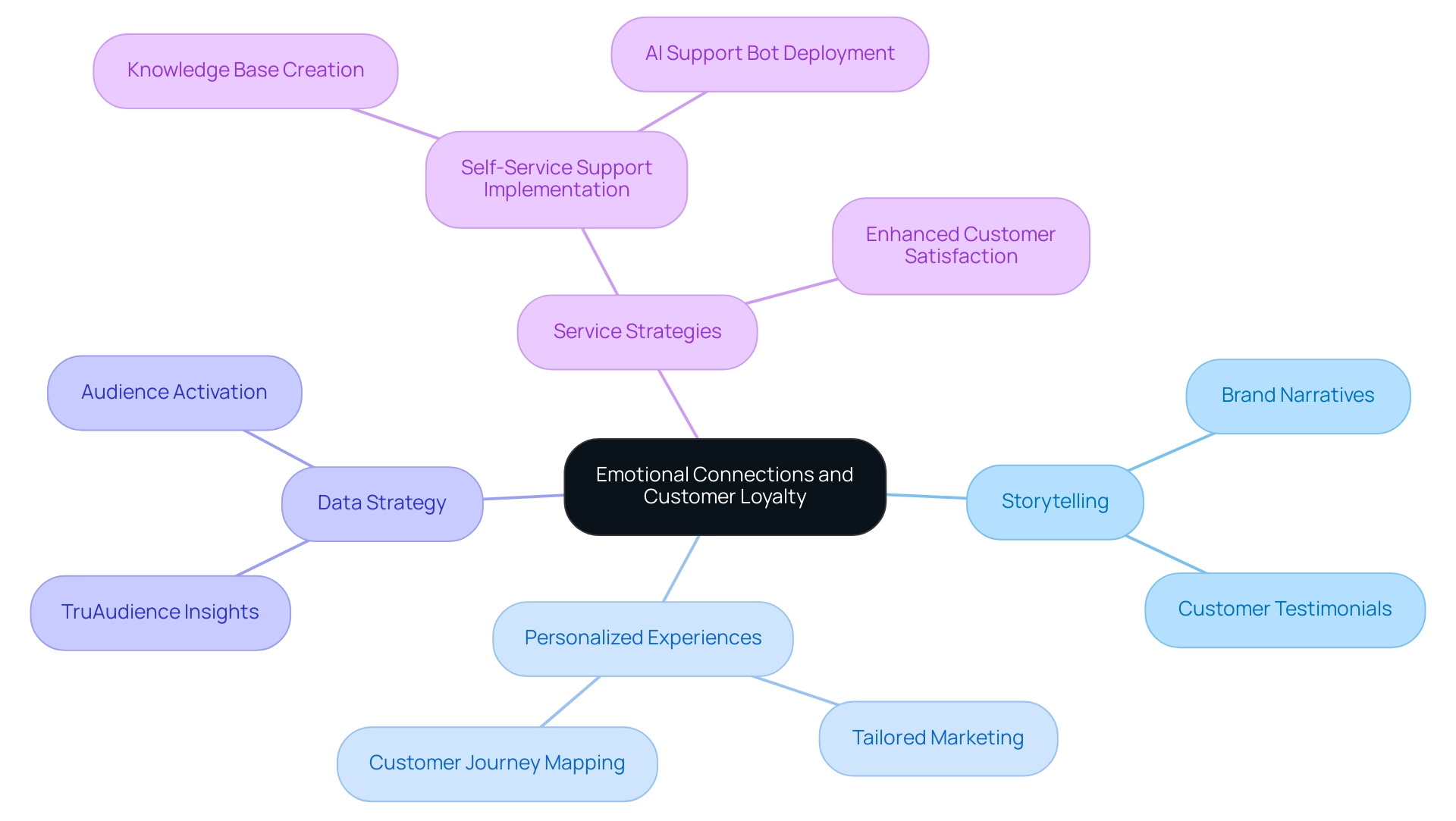
Strategies for enhancing customer loyalty: Practical approaches
Boosting client commitment is no small feat. We understand that navigating customer loyalty can feel overwhelming. However, a multifaceted strategy can illuminate the path forward. This includes:
- Implementing effective reward programs
- Embracing personalized marketing
- Delivering exceptional service
Tamas Oszi, a Certified Loyalty Marketing Professional, underscores the significance of these strategies in nurturing customer relationships. Loyalty programs that provide meaningful rewards — like exclusive discounts or early access to new products — act as compelling motivators for repeat purchases.
Consider this: 63% of consumers believe that CEOs with transparent social media profiles better represent their companies. This insight reveals that visible leadership can foster trust and loyalty. A case study titled ‘CEO Transparency and Consumer Trust’ shows that one-third of consumers would be more inclined to purchase from brands if their CEO demonstrates transparency on social media. This highlights how leadership visibility significantly influences consumer trust. Additionally, personalized marketing strategies, tailored to individual preferences, can greatly enhance engagement. Yet, it’s important to note that only 22% of consumers feel very satisfied with the level of personalization they currently receive.
By prioritizing these strategies, businesses can cultivate stronger connections with their clients. This understanding leads to identifying the most direct cause of customer loyalty, ultimately enhancing long-term commitment and retention rates. Notably, brands that offer chat support experience a remarkable 48% increase in customer return likelihood and a 41% boost in brand trust. This further emphasizes the critical role of responsive engagement in building loyalty.
So, let’s take these insights to heart and explore how you can implement them in your business today.
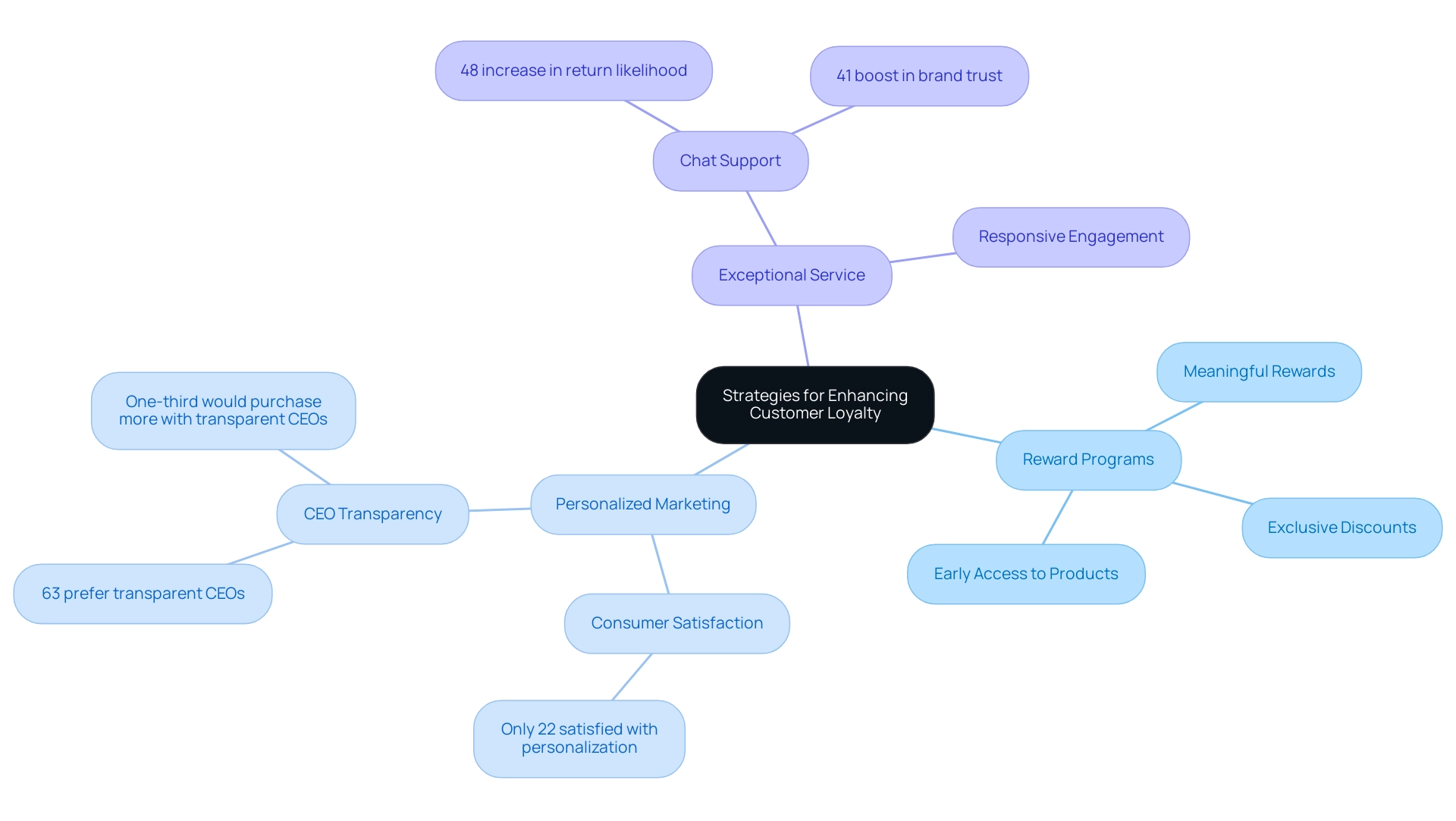
Conclusion
Building customer loyalty is no longer just an option; it’s a necessity for businesses aiming for long-term success in a competitive landscape. We understand that this journey begins with recognizing that loyalty goes beyond mere transactions; it’s deeply rooted in emotional connections, trust, and satisfaction. It’s concerning that only a small percentage of consumers feel satisfied with current loyalty programs. This signals a crucial opportunity for brands to innovate and personalize their strategies.
Key drivers of loyalty include product quality and brand trust — both essential for cultivating lasting relationships. Brands that prioritize these elements, combined with transparent communication and emotional connections, will not only retain customers but also turn them into advocates. The shift in consumer behavior, particularly among younger generations, highlights the urgent need for brands to adapt and meet evolving expectations.
Moreover, exceptional customer service plays a pivotal role in enhancing loyalty. Companies that go above and beyond customer expectations through timely and empathetic support are more likely to foster long-term relationships. Investing in tools that facilitate seamless communication can significantly improve customer experiences and satisfaction levels.
Ultimately, integrating effective loyalty programs, personalized marketing, and outstanding customer service creates a comprehensive approach to nurturing customer loyalty. By focusing on these strategies, businesses can build deeper connections, drive retention, and achieve sustainable growth in an ever-evolving marketplace. The future of customer loyalty lies in the ability to forge emotional bonds and respond proactively to customer needs, ensuring that brands not only survive but thrive.
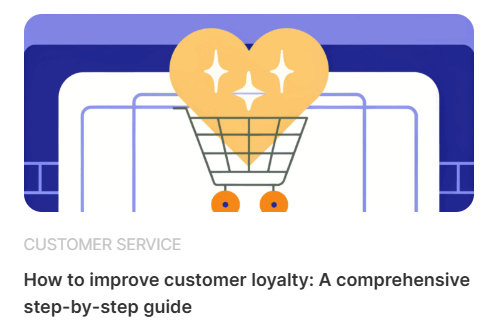



![Top 10 scenarios of angry customer situations [scripts examples]](https://www.dashly.io/blog/wp-content/uploads/2023/03/Script-templates-and-tips-for-dealing-with-angry-customer-scenarios-720x317.png)

